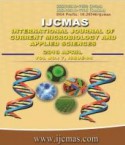


 National Academy of Agricultural Sciences (NAAS)
National Academy of Agricultural Sciences (NAAS)

|
PRINT ISSN : 2319-7692
Online ISSN : 2319-7706 Issues : 12 per year Publisher : Excellent Publishers Email : editorijcmas@gmail.com / submit@ijcmas.com Editor-in-chief: Dr.M.Prakash Index Copernicus ICV 2018: 95.39 NAAS RATING 2020: 5.38 |
Cluster bean (Cyamopsis tetragonoloba L.) is an important legume crop of India which can thrive well in adverse conditions. Despite of the fact that P is abundant in the soil it cannot be assessed by plants. Bacteria like rhizobium isolated from root nodules have potential to solublize the insoluble phosphorus. Thus, it plays a vital role in enhancing the phosphorus availability and overcoming phosphorus deficiency through its transformations into available form and thereby enhancing the agricultural productivity in a sustainable way. Soil samples were collected from the fields located at three districts of Haryana. Further isolation and characterization of rhizobial isolates was carried out in screen house and phosphorus soulbilization efficiency was measured. A total of 14 rhizobial strains were isolated from the root nodules of cluster bean which was collected from different villages of Haryana. On the basis of morphologically, biochemically, they were recognized as rhizobia. All isolates were tested for the phosphate solubilization on YEMA and Pikovaskaya’s medium plates. Among 14 rhizobial isolates, 7 were found to solubilize phosphorus efficiently after 7 days of incubation at 30ºC, however their P- solubilization efficiency varied from 36 to 79%. These rhizobial strains were observed to be efficient in solubilizing the phosphate. As rhizobia can act as a phosphate-solubilizer along with nitrogen fixation makes these strains efficient to be utilized for the production of biofertilizers, which can improve the availability of major growth limiting nutrients like phosphorus in soil and enhances the agricultural production.
 |
 |
 |
 |
 |